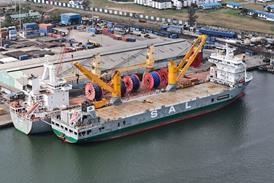April 11 - The biggest ever edition of the Intermodal South America transport, logistics and trade show kicked off yesterday in Sao Paulo, Brazil and all the political big guns in the transport and port sectors were there in an unprecedented show of force
There has been talk that the Special Ministry of Ports (SEP) might be scrapped and its functions subsumed by the Ministry of Transport, and Pedro Brito (pictured right below), the former - and first - Minister of Ports was on the high-powered panel that opened the conference, as was his successor Jose Leonidas Cristino (pictured left below), and the ports minister himself, Paulo Passos.
These are key days in the transport and logistics sector for Brazil which is undergoing an economic boom right now that is causing significant transport "Gargalos", or bottlenecks and a new National Logistics Plan (PNLI) was launched that will combine two existing plans - the National Transport Plan (PNLT) and the Naitonal Ports Logistics Plan (PNLP).
And it was the first time Cristino and Brito (who is now a director at the Waterways, Maritime and Ports regulatory board Antaq) had been on the same panel at any conference. Both made calls to arms - well for even more logistics progress at least - to the packed auditorium but Cristino's was the louder and more passionate: hardly surprising considering it is his job that is at stake if the SEP is disbanded.
Passos, who is now in his third term as Minister of Transport and is regarded as a safe pair of hands, said that the government was now working on this new (PNLI) logistics plan for the country, which would merge the existing two plans.
He told the conference: "It is an ambitious plan, for sure, but it will create a concentrated mobilisation of forces for the good of the country. We will look to Reporto [the legislation that allows gantry cranes to be imported without paying punitive, 45 percent plus import taxes] as an example of how we can improve matters, to stimulate investment. We will identify the problems and then invest in infrastructure with a clear direction."
Up to USD300 billion could be invested in infrastructure projects under the plan by the year 2030.
All three agreed that the current transport matrix in Brazil - with 60 percent of cargo within its borders moved by road, 25 percent by rail and just 13 percent by cabotage - would have to change dramatically in favour of rail and sea.
With 67 port terminal contracts - made before the Port Law of 1993 - running out this year, and new tenders in the pipeline, the existence (or not) of the SEP will be a key aspect of how these concessions will be tendered for. The maritime and ports sectors have been pleased with the progress - in dredging and some new facilities - since the SEP was inaugurated five years ago, and will be aggrieved if it is swallowed up by the Ministry of Transport.
One member of the audience who is involved in the transportation of project cargo, but who did not wish to be identified told HLPFI: "The SEP is a good thing because it gives focus to our sector and channels government funding more quickly to where it is needed. This politicking and these new long-term transport plans need to be resolved soon or the country as a whole will suffer."
The 18th Intermodal South America has a record number of 550 stands and many of the small booths have moved outside of the main exhibition area and into the entrance hall to maximise the space allocation. The organisers, UBM Media, say that more than 45,000 people will attend the event, which will also set a new record.
















